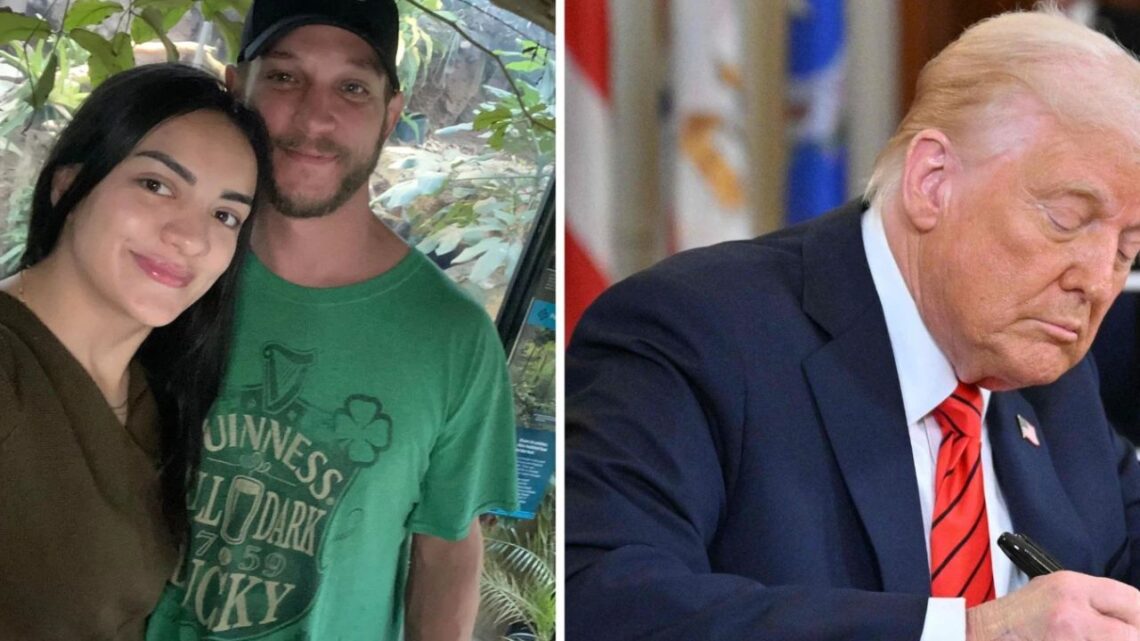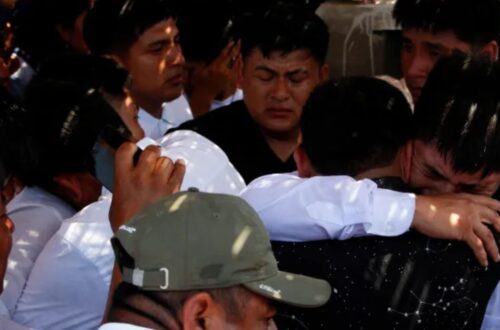ICE Custody: When a married couple plans their future, they expect stability, happiness—and respect under the law. But even with the best plans, one mistake or misunderstanding with immigration can turn life upside down.
This is the story of Bradley and Camila—a couple whose marriage collided with harsh immigration rules. Bradley voted for Trump, yet his Peruvian wife is now trapped in ICE custody.
Their case raises urgent questions about fairness, immigration laws, and what can happen when bureaucratic systems fail real people.
What Happened: The Detention of Camila Muñoz
Honeymoon turned nightmare
Bradley Bartell and Camila Muñoz had just married and honeymooned in Puerto Rico. On their return flight, at the airport, they were stopped by an immigration agent.
Bradley, an American citizen, was questioned and allowed through. But when Camila was asked if she was a U.S. citizen, she said no—and was immediately taken into custody for questioning.
Her visa and green card status
Camila had been in the U.S. since 2019 and was working legally with a proper visa (W-2). That visa had recently expired, and she was in the process of applying for a green card. Bradley and Camila believed that, since her application was ongoing and she had no criminal record, they would not face trouble. But ICE didn’t see it that way.
Confusion, fear, and separation
It took Bradley almost a week to locate Camila in a private immigration facility in Louisiana. Phone calls became their only contact. Bradley described the conditions she faced: “trapped in a room with 100 other people,” with almost no comforts, scarce resources, and no clear timeline for release.
All their savings—money they’d set aside to buy a house—are now gone, spent on legal fees and attempts to secure bond money. Bradley even started a GoFundMe campaign aiming for $30,000 to help support their fight.
Legal and Political Background
Overstaying a visa: Civil, not criminal
Legally, overstaying a visa is not a criminal offense—it is treated as an administrative violation. Still, the Trump administration has often lumped all unauthorized immigrants under the label “criminals.” ICE now seems to use broader criteria in detaining people.
Who is at risk under the current crackdown
Advocates say ICE has “widened the net.” That means more people—ones who were traditionally safe—are now vulnerable. Anyone who is not a U.S. citizen or legal permanent resident could be targeted.
Jesse Franzblau, a policy analyst, warns that even individuals with pending legal status are now being detained more aggressively.
Consequences of visa overstay
Overstaying a visa can lead to a 10-year ban from entering the U.S. However, there is a legal pathway to forgiveness: if your spouse is a U.S. citizen, you may apply for a waiver of unlawful presence. That can help restore immigration status without triggering the full ban.
In Camila’s case, since Bradley is a U.S. citizen, this waiver possibility might help her—if the legal system cooperates.
Timeline & Important Facts
| Item | Details |
|---|---|
| Entry into U.S. | 2019 |
| Work visa | W-2 visa (then expired) |
| Current status | Applying for green card |
| Detained by ICE | At airport returning from honeymoon |
| Detention location | Private facility in Louisiana |
| Legal cost & bond demands | Legal fees + bond up to $10,000+ |
| Fundraising efforts | GoFundMe: target $30,000 |
| Overstay impact | Administrative violation, potential 10-year ban |
| Possible relief | Waiver of unlawful presence (because married to U.S. citizen) |
The Emotional, Legal, and Ethical Impacts
Bradley and Camila’s story is about more than laws—it’s about human lives at risk.
- Emotional toll: Being separated from your spouse, unsure of your future, is painful and traumatic. Bradley says he worries daily for Camila’s safety and health.
- Financial burden: Their life savings are now consumed by legal costs. The dream of a home must wait.
- Legal uncertainty: Even when you do everything “right,” immigration systems can fail.
- Policy questions: Should someone who is already in the process of legalizing their status be treated as a criminal? Do blanket crackdowns respect justice?
What’s Next & What Can Help
- Legal representation
Camila needs skilled immigration attorneys who understand waivers, appeals, and constitutional protections. - Advocacy and public pressure
Public awareness and media coverage can push agencies to act humanely or reconsider policies. - Using immigration relief tools
The waiver of unlawful presence (because Camila is married to a U.S. citizen) could reduce or cancel the 10-year ban risk. - Support campaigns
Donations to legal defense funds, GoFundMe campaigns, and nonprofit groups can ease the financial strain. - Policy reform
Long term, the system must balance enforcement with fairness—so that spouses like Camila are not swept up despite having legitimate claims.
This heartbreaking story of Bradley and Camila shows how fragile life can become when immigration rules are enforced without compassion. Even someone who followed the law, paid taxes, and tried to become a legal resident can be detained unexpectedly.
Their struggle forces us to ask: are our systems fair? Can love and marriage protect you in times of crisis? The case stands as a warning to many—and a call to reform how immigration law treats real people going through hard journeys.









